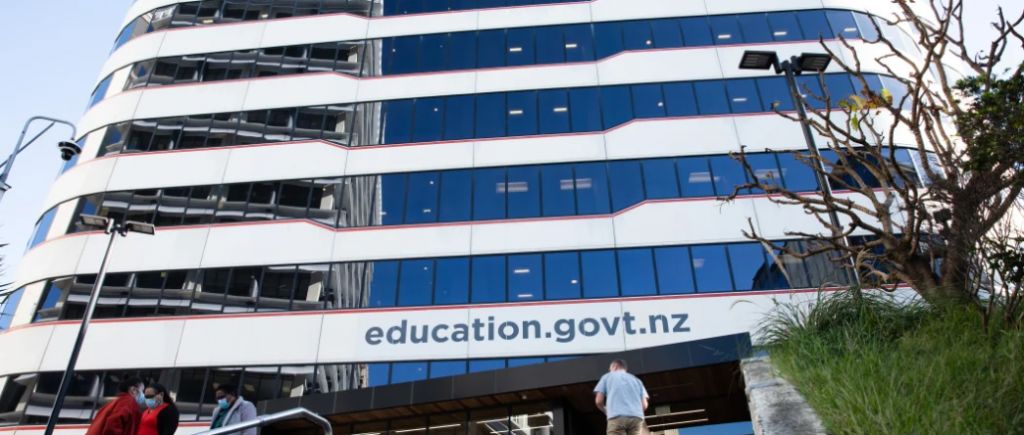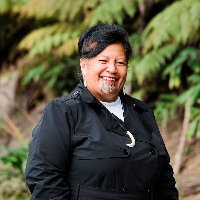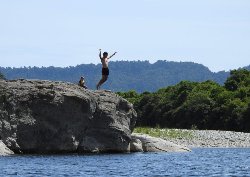Maiden Speech Notes For Keith Locke
Maiden Speech Notes For Keith Locke
GREEN MP
TUESDAY
15 FEBRUARY 3.55pm
Mr Speaker
I'd first like to thank all those friends and relations who are with me in this House today, as they have been through my life and through many political battles.
I'm honoured to have present my partner Michele, my mother, Elsie, and my sisters Maire and Alison, with all their children.
And I know my late father Jack is here in spirit.
I come from a family of frontline campaigners for social change and I hope to carry that tradition into this House.
In my first speech here I would like to acknowledge the tangata whenua of this area. Te Atiawa, and Ngati Toa especially, who settled around this great harbour, Te Whanganui a Tara, many years ago.
I pay tribute to them as the great, great, great grandson of William Morrison, an English labourer, who landed on shores of Te Whanganui a Tara in 1840, the year of the Treaty.
In the 160 years since, Maori, Pakeha, and people of other races have laboured together to build our nation. But we must never forget that much of this progress has been on the backs of Maori people.
So over the years I've supported Maori efforts to regain their land, language and cultural rights, and to reassert their role in our society and politics.
For instance, in the 1970s I campaigned with Joe Hawke, now a colleague in this House, in support of the 301 day Ngati Whaatua occupation of Bastion Point.
This campaign finally overcame a hostile government, and the parliament legislated in favour of the Ngati Whaatua getting their land back.
>From this occupation, and from many of the other grassroots campaigns I've been involved in,
I've learnt that real change is generated from outside Parliament, by people's movements.
That ordinary, humble, people have a huge capacity to act together for the common good.
They have a willingness to sacrifice that I've seen time and again. I've seen it on the picket line, when I've been working in industrial jobs.
I have had the privilege to work alongside two current MPs in industry: Willie Jackson at the Auckland City abattoirs, and Philip Field at Gear Meatworks in Petone.
At Gear Meat, Philip was union secretary, I was the meat-grader's delegate. As fellow unionists, we opposed the company's attempts to cut wages and conditions.
On one occasion the company locked out the Gear Meat workers for seven weeks, but the workforce remained staunch.
Even after six weeks, with the debt collectors breathing down their necks, the workers still voted 90% by secret ballot to hold firm.
So I have total faith in ordinary people's determination to fight for their rights, and to actively address community issues provided they are given just some hope, are not blocked at every turn by heartless bureaucrats, a hostile government, or legislation like the Employment Contracts Act that restricts how they can organise and act.
I see my role in this parliament, first and foremost, as a representative of all those active community groups who are pushing good causes from better public transport to humane treatment for refugees, from organic farming to nuclear disarmament.
I mention nuclear disarmament, because there could be no better illustration of a successful grassroots movement changing government policy.
I'm proud to have in the gallery today, my mother Elsie Locke, who was one of the founders of the Campaign for Nuclear Disarmament, and helped to gain 80,000 signatures on a 1960s petition calling for a nuclear free Southern Hemisphere).
I am also proud to have here my sister Maire Leadbeater, a spokesperson for CND during the big anti-nuclear protests of the 70s and 80s.
Many thousands of New Zealanders joined that campaign against the bomb. Anti-nuclear sentiment swept through our nation (and through the Labour Party), and we are now a nuclear free country.
But we still have a long way to go on the nuclear issue to actually take the weapons of mass destruction off America, Russia and the other nuclear states. We need complete nuclear disarmament.
And that requires effective international action.
One of the reasons I'm a Green is because the Greens have a truly global outlook.
There are 100 Green Parties around the world
Working together for common goals
Such as promoting peace rather than war as a solution to problems,
Trying to save the earth from nuclear conflagration
Combating global warming
And trying to counter the growing inequality between rich and poor on our planet.
The problems are huge and there are too few nations offering solutions, which why I believe that New Zealand, even though we are a small nation, can play an important world role as a moral and political leader.
But first we've got to think and act for ourselves. For example, whether the Australian government wants us to buy frigates, or f-16s, or increase defending spending is utterly irrelevant to any decision we make.
We shouldn't do anything just to get brownie points from another government.
Of course, we'll listen to Australia, or China, or Cuba or anyone else who wants to give us advice.
But a lot of that advice will be bad.
You just need to look at Australia's disastrous defence policy towards East Timor, where they even had a military pact with the murderous Indonesian generals; where Australian intelligence helped the Indonesians target East Timorese independence activists.
For many years, New Zealand went along with Australia's support for the dictator Suharto and its opposition to East Timorese independence.
As a consequence, New Zealand now shares a responsibility for the Timor tragedy. Some of the blood of the 200,000 East Timorese who have died is on the hands of former New Zealand ministers and officials who were so subservient to Canberra and Jakarta all those years.
We should learn lessons from that.
One lesson is that regional security lies not in supporting generals or authoritarian rulers, but in backing the human rights campaigners, be they in Indonesia, Malaysia, China or Tibet. The development of democracy in those countries is the real guarantor of security.
And it means we shouldn't be imitating the arms spending of Australia or the Asian nations. Singapore, a country smaller than us, spends $NZ9 billion annually on defence, wasting much of it on submarines and big ticket items.
It's obscene that the world spends $NZ1600 billion a year on armed forces. We could solve a lot of the world's problems with that money. With just a portion of this $NZ1600 billion we could provide a decent education to all those children currently denied it. And we could address heaps of the world's environmental problems.
Therefore, I believe New Zealand should take the lead in conventional disarmament, as we have in nuclear disarmament.
We should reduce our present armed forces to focus on effective peacekeeping, fisheries monitoring and disaster relief.
We don't need Skyhawks, F-16s or frigates.
There is no longer a Cold War enemy to use them against.
Alongside our own disarmament programme we should redefine our defence relationship with Australia to reflect our real common interests in peacekeeping, marine surveillance and relief work.
Our defence relationship works well in the area of peacekeeping as I saw when I visited East Timor recently with the Defence Minister's delegation.
But we don't need to be part of Australia's preparations for a major war with all the air and sea combat capacity that such an approach obliges us to get.
To become a truly independent nation we have to overcome our traditional subordination not only to Australia, but also to Britain and America.
Acting in our own interests means, for example, closing down the Waihopai electonic spybase, near Blenheim, which is used primarily by the American National Security Agency to spy on other nations.
This undermines our own good relations with Japan, Asia, Pacific nations and Europe.
We should also break free of the British Crown and become a republic. The question is not whether the monarchy has a lot of power over us. In practice it doesn't. The problem is that bowing before the British Queen relects a colonial mentality.
That holds us back from a true nationhood.
The monarchy is a feudal relic that has no place in the 21st century. Nobody should rule, as Queen Elizabeth does, purely because of an accident of her birth.
I believe the monarchy is an issue we should address now, rather than wait a few years, as the Prime Minister suggests. I will try to advance the republican debate during this parliamentary term.
One of the reason Green politics has struck such a chord among young people is that we are not mired in the past.
Sure, we take the best of all the socialist and social democratic tradition in terms of caring for people, working cooperatively and in the provision of social services.
But we go beyond the hierarchical, top-down approach ingrained in much of that tradition particularly in the delivery of state services and in the realm of party organisation.
We also reject the moral conservatism that still influences much of socialist and social democratic politics.
Hostility from some of the older, more morally conservative voters will not stop us from tackling the controversial issues like marijuana use and abuse which we address with education and counselling, not punitive solutions.
Unlike the other parties we don't take the cowards way out and say that issues like drug law reform are "conscience" issues that parties don't need to take a stand on.
We're for fronting up to the hard issues getting them out into the public and parliamentary arena.
We are for a much more open and democratic society and that is certainly in tune with the thinking of young New Zealanders
We celebrate individuality, fre speech and diversity and its great that we now have the world's first Rastafarian and transexual MPs in our Parliament.
Some people, including a few in this House haven't quite clicked that we represent an entirely different style of politics to the traditional hierarchical, somewhat conformist, keep-the-debates-behind-closed-doors style of politics.
We will be openly debating government policies. While working co-operatively with the government to get the best possible legislation through.
The more that is debated in the public arena the better because that helps ordinary people become part of the debate; which is vital if we are to change society; because as I said before it is ordinary people and people's movements that are the main driving force of change, not governments.
This concept of movement politics is the key. And the Greens are most in tune with it.
Our ethos and our party structures are an extension of the non-hierarchical cooperative structures of issue movements that have spread through our society
* be they rank and file union caucuses, women's groups, health action networks,
* or the ones I have been most associated with: groups campaigning for peace and human rights internationally.
The Greens parallel these movements in having a consensual approach to decision-making and not putting leaders on a pedestal.
To me, the cult of the Leader is a problem in New Zealand politics. In our parliamentary system, too much weight is put on the what Party Leaders say.
Consequently, as a counterpoint to some of the other maiden speeches, I will not pay tribute our co-leaders Jeanette Fitzsimons and Rod Donald.
Because while we respect their experience and wisdom we all operate in our caucus and in our party as equals and give no person or people special powers.
Another thing that attracts people to the Greens is that we are a visionary party.
We are looking several generations ahead when we work out what we are promoting today.
In this parliament we will be promoting carbon taxes (to slow down fossil fuel use and global warming) even if some motorists, thinking in the very short term, do get upset. And even if government parties get jittery about this.
We have to look at not just what we need for ourselves today but what our children and grandchildren will need in the future.
I am so pleased to have in the gallery so many of my nieces and nephews and young friends,
I don't want them to inherit cities criss-crossed with motorways, choked with cars and fumes, and with suburban segregation between race and class.
We need to whole new approach to our cities, to town planning so that we have brilliant public transport systems, walkways and cycleways; so that all public facilities are easily accessable; so that we have a vibrant and diverse community life, and we really look after each other's interests.
To achieve this we need a vision, not short-term pragmatic thinking.
And we need to be strong, because we'll be taking on entrenched power and privilege, both here and overseas.
But I'm not disheartened because the grass-roots movement politics that is at the heart of the new green politics is having some impact.
We saw that in Seattle last year, at the time of the World Trade Organisation meeting when tens of thousands of activists turned up from all kinds of community, union, indigenous and environmental groups and they pushed the advocates of free-market globalisation back on their heels.
These anti-WTO demonstrators were addressing a central issue of the 21st century.
How do we stop our lives being dominated by the Mitsubishis, Monsantos and the Microsofts, the big transnational corporations run by people who are not accountable to us, but who determine so much of what happens on this planet.
In the 21st century we have to determine how to return the power to the people, in their communities and their parliaments.
Without that power we won't be able to properly address the global problems of social injustice and environmental degradation that so beset us today.
ENDS


 Gordon Campbell: On The Public Sector Carnage, And Misogyny As Terrorism
Gordon Campbell: On The Public Sector Carnage, And Misogyny As Terrorism DoC: Canterbury Spotted Skink In Serious Trouble
DoC: Canterbury Spotted Skink In Serious Trouble Te Pāti Māori: Oranga Tamariki Cuts Commit Tamariki To State Abuse
Te Pāti Māori: Oranga Tamariki Cuts Commit Tamariki To State Abuse NZCTU: Inflation Data Shows Need For A Plan On Climate And Population
NZCTU: Inflation Data Shows Need For A Plan On Climate And Population Statistics New Zealand: Annual Inflation At 4.0 Percent
Statistics New Zealand: Annual Inflation At 4.0 Percent Brendon McMahon - Local Democracy Reporter: West Coast Swim Spot Testing Clear Of E-coli
Brendon McMahon - Local Democracy Reporter: West Coast Swim Spot Testing Clear Of E-coli Green Party: Government Throws Coal On The Climate Crisis Fire
Green Party: Government Throws Coal On The Climate Crisis Fire


